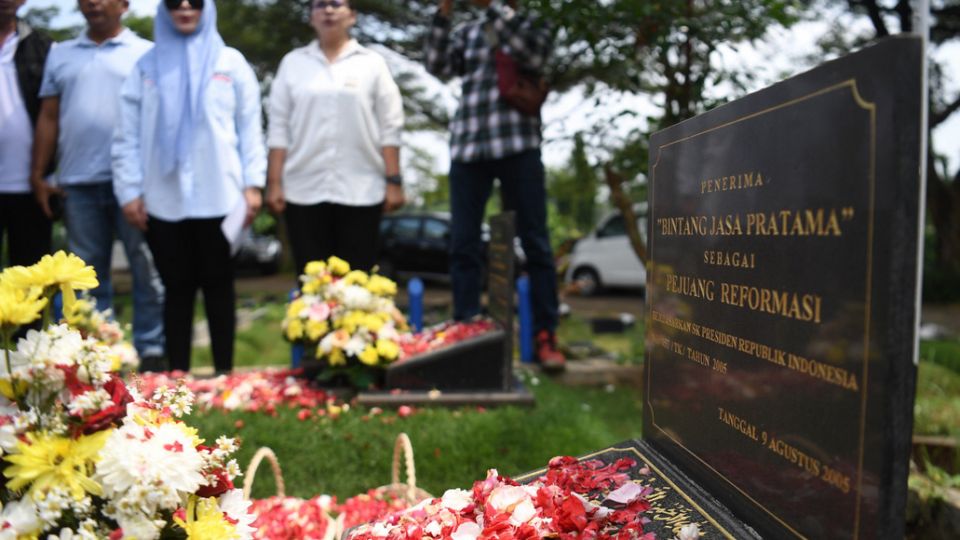May 14, 2024
JAKARTA – For many of the victims and families affected by the bloody riots in May 1998, the hope for “closure” has slowly eroded with every passing year and every subsequent administration that has promised to bring the perpetrators to justice.
Mere months before president-elect Prabowo Subianto is sworn in, however, they must once again put their faith in a government that says it is committed to upholding the rule of law but which is also inextricably linked to the nation’s dark past.
Indonesians commemorated the 26th anniversary of the Trisakti Tragedy and the May riots on Sunday, paying respect to those who fell victim to the mass unrest that eventually spelled the end of the New Order regime.
Among them was 63-year-old Sarmah Ameh, who joined a gathering to remember the passing of loved ones at the office of the National Commission on Violence Against Women (Komnas Perempuan) in Jakarta on Sunday.
“Some days, I am at peace and not saddened by these memories, but as a parent, you will always remember,” she told The Jakarta Post before the event.
“You just never forget,” she said.
Two of Ameh’s children were victims of the tragic 1998 arson of City Plaza Klender Mall, then named Yogya Plaza Klender, which saw hundreds of people trapped inside as fire burned the building down.
Another griever, Raden Mulia “Iwang” Awangga, said he only wanted peace of mind after years of mourning his late older brother Elang Mulia Lesmana, one of four Trisakti University students who were killed on May 12, 1998.
“I pity the other parents who keep getting older and being asked every year to dig up their grim memories. I myself just want to move on,” he told the Post on Saturday.
Elang was shot dead during the violence that broke out after authorities sought to disperse student protesters headed for the House of Representatives.
Although he and the three other fallen Trisakti students were named national heroes by former president Susilo Bambang Yudhoyono in 2005, no one has been held accountable for the large-scale unrest that saw security personnel fire live bullets at the students.
The joint fact-finding team set up in the aftermath of the tragedy and led by Soeharto’s successor, BJ Habibie, found that it was systematically planned and executed.
Lacking reparations
The Trisakti tragedy and the 1998 May riots have forever etched a dark chapter in Indonesia’s history, bookending the New Order era and precipitating the eventual resignation of then-president Soeharto later that month.
The lives lost in the riots reached over 1,200, according to the joint fact-finding team. The victims encompassed activists facing repression from security forces and ethnic Chinese Indonesians who became targets of looting and gang rape in the midst of the chaos.
The victims’ families have consistently called for justice and accountability throughout the years, with little to no results.
Last year, President Joko “Jokowi” Widodo designated a dozen past cases of human rights atrocities, including the tragedies in 1998, as gross human rights violations.
Jokowi expressed regret over the incidents, a first for any Indonesian leader, and set off a process offering non-judicial settlements for the victims’ families.
But many considered this gesture far from being enough.
Dimas Bagus Arya, coordinator of the Commission for Missing Persons and Victims of Violence (Kontras), spoke of the need for the next government to offer the long-sought judicial path to uncover and indict the perpetrators of the 1998 incidents.
“The government has a duty to provide the families access to justice and access to truth. Indonesia has sufficient materials to bring these cases to resolution through court according to Law No. 26/2000 [on the human rights court], which has rarely been used,” Dimas said on Saturday.
A new hope
As Prabowo prepares to form his new government later this year, many of the victims’ families of the 1998 tragedy continued to cling to hope for judicial settlement, although some contend they will be “realistic” about the prospect of being served justice through the courts.
“To be honest, I’ve grown tired of calling for justice [for my brother], because after 26 years there just seems to be no end to this fight legally,” Iwang said, hoping for “closure”.
He now only wished that his brother’s death would not be in vain and that “the values of Reformasi [reform movement] remain in place during Prabowo’s presidency”.
The former son-in-law of late strongman president Soeharto, Prabowo has been accused of involvement in the kidnapping of student activists in 1998 and rights abuses in Papua and the former East Timor. The allegations remain unproven, and Prabowo has always denied responsibility.
The defense minister’s spotty rights record remains a sensitive topic for those still reeling from the 1998 tragedy, and remains a point of contention even among today’s university students.
“He was indeed suspected of human rights violations, but as a leader whose campaign promise was to uphold the rule of law, we need to see him [follow this up] by resolving past cases of the ‘98 tragedy,” said Faiz Nabawi, president of Trisakti’s student executive body, on Saturday.
Meanwhile, Komnas Perempuan commissioner Veryanto Sitohang highlighted the need to ensure that human rights violations did not repeat themselves in the next presidency.
“[This is why] we commemorate these tragedies with the victims’ families every year. It is the only way to honor the memories of what has happened in the past,” he said.


